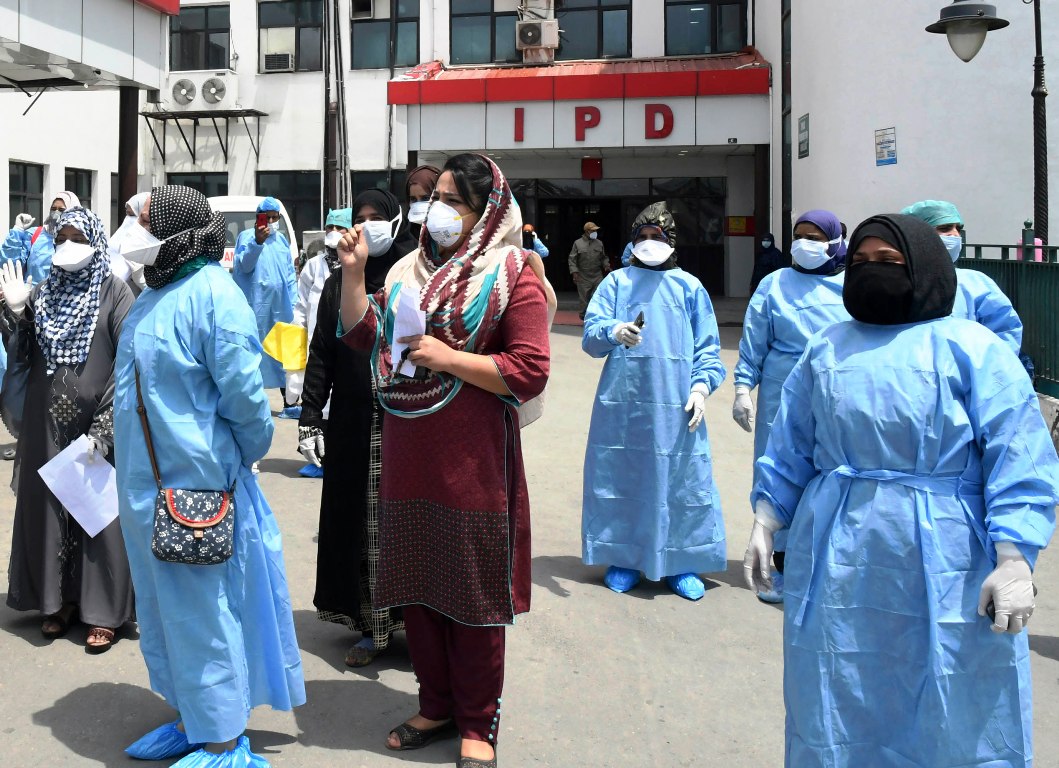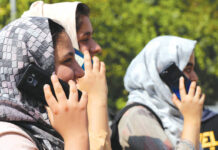by Joziea Farooq
‘Absorbing grief in Nursing is nothing new, but the degree to which it’s occurring now is staggering.’
The nursing profession is a stressful one even under normal circumstances. The demanding hours, psychological strain and cumbersome work processes can cause burnout, one of the most common conditions affecting nurses across the world. Anyone who has studied Nursing will tell you that the profession is a combination of cynicism, exhaustion, and the perceived inefficiency.

Nurses are the front line workers of the Covid-19 pandemic, providing life- saving care for affected patients. Psychological distress can be significant for nurses and other health workers who provide direct care for these patients. To provide best support nurses, understanding the psychological effects of Covid-19 on them, the impact of secondary traumatic stress and ways to manage these effects during this stressful time is important.
Psychological Impact
While the Covid-19 pandemic is spreading with the speed of light, frontline workers shoulder the burden of systemic unpreparedness. Nurses are facing unprecedented stressors in their professional and personal lives, compounded by uncertainty about the future. For those working directly with Covid-19 patients, fears include being put in the position to care for patients while being understaffed or without proper personal protective equipment which could lead to contracting the disease.
Many nurses in Jammu and Kashmir working in isolation wards experience a high level of anxiety related to the transmission of Covid-19 disease. Most of the nursing officers working at Jhelum Valley Hospital (SKIMS Bemina), Medical College, SKIMS and GMC Anantnag shared their first-day experience in the isolation ward. Most of these nursing officers experienced mild anxiety related to the availability of PPE kits, direct contact with the patients and loneliness during quarantine time.

Inefficiencies in testing and a refusal by the public to follow the recommended safety protocols have allowed the virus to spread. Nurses working in other areas, such as out-patient department, psychiatry facilities may worry about contracting Covid- 19 from the asymptomatic patient. However, this worry is greater for nurses working in emergency departments due to the possibility of unknowingly contracting Covid-19 and passing it along to other patients at work, those they live with, or members of the community during essential errands.
Although the world experienced SARS in 2003 and N1H1 in 2009, the outbreak of Covid-19 as new infectious disease severely tested the global health system. In this context, health workers are the man force in the battle against the war especially nurses who act as gatekeepers for stopping the entry of Covid-19 in the community, bear the monuments task.
Fear of Covid-19 has increased mainly because of three reasons: (a) The fact that no vaccine or evidence-based treatment is identified, (b) High transmission of spreading, and (c) Media and social media is misrepresenting the facts and focus on anecdotal information.
No one knows how long the uncertainty is going to last, and that has had significant impacts on the mental health of healthcare workers. More than any other target group, they are in danger of getting sick from exposure to the virus. The fact that hundreds of health care workers across the globe have succumbed to the disease has only increased the worries. Experts predict that the traumatic effect will linger long after the virus is contained.
Other sources of stress include balancing professional and personal lives, such as caring for children who are out of school due to pandemic or elderly parents who are at risk for serious morbidity if they contract the disease. Financial stress, grieving life prior to Covid-19, and sorrow over the loss of restrictions can compound the distress. Periods of quarantine can pose additional psychological stressors, such as the fear of death and emotions of loneliness and anger, along with loss of income and a further decrease in social connections.
Studies are emerging on the psychological effects of these stressors for healthcare workers:
Niunu Sun and colleagues found that all the maximum number of nurses in direct contact with patients with Covid-19 in China experienced a significant amount of negative emotions in the first week of duty in isolation wards.
Lijun and colleagues found that the nursing staff in Wuhan, China reported the symptoms of subthreshold mental health disturbances (36.9%), mild disturbances (22.4%), moderate disturbances (22.4%) and severe disturbances (6.2%).
Coronavirus: 2 Leh Nurses Changed The Discourse Within And Outside The Hospital
Lai and colleagues found that a considerable portion of healthcare workers in direct contact with patients with COVID-19 in China reported symptoms of depression (50%), anxiety (45%), insomnia (34%), and distress (72%).
Providing support

Nurses and healthcare workers are currently facing challenges that they likely have never experienced before in their careers. Life will return to a more familiar routine and pace, but the timeline is unknown. Nurses must support themselves and their colleagues in the same way they support patients. Addressing psychological distress through proactive self-care, employer support, and community resources have the potential to reduce both short and long-term psychological effects of Covid-19.
(The author is a PG scholar in pediatric nursing at SKIMS Soura and presently posted as In-charge Nursing officer at the emergency department of GMC Anantnag. The opinions expressed in this article are those of the author’s and do not purport to reflect the opinions or views of Kashmir Life.)















